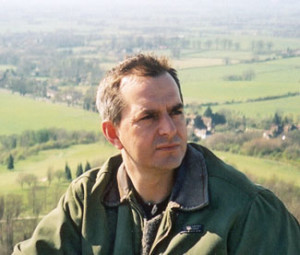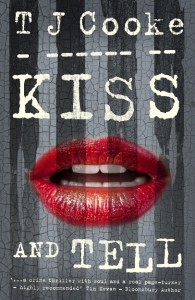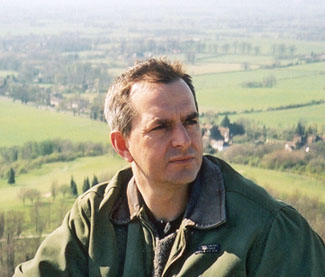OLD POST ALERT! This is an older post and although you might find some useful tips, any technical or publishing information is likely to be out of date. Please click on Start Here on the menu bar above to find links to my most useful articles, videos and podcast. Thanks and happy writing! – Joanna Penn
It's generally understood that many fiction writers have a semi-autobiographical protagonist in their first books. Certainly Dr Morgan Sierra, in my ARKANE series, is my own kick-ass alter-ego!

But whatever we write, bringing our own personal experience to the page only enriches and deepens the experience for the reader.
In today's guest post, crime thriller author T.J. Cooke guides us through some questions that will help us bring more of ourselves to the page.
As writers mature, their content and style are increasingly influenced by their life experiences, which can become a crucial part of the writing process. Whether it’s a scene or location that you long to recreate, a nuance of someone’s personality that is just what your character needs, or the recall of a hurtful feeling that helps portray emotion… each could be valuable.
It’s not always easy to draw on your own experiences. Though some may be joyous and celebratory, others are likely to be delicate or painful, but if you aim to write with authenticity then sometimes you have to be brave.
Let’s have a look at the sort of experiences that can be helpful. In doing so I’ve revisited some of my own influences, to see how these have shaped my work.
(1) Childhood and Upbringing
What were the themes of your childhood that still resonate through your life today?
Many writers draw upon their childhood for inspiration. Roald Dahl’s work is littered with the good, the bad and the ugly of his younger days. He had a miserable time at school and once said that the main highlight of his day was his trip to the sweetshop on the way home. He used to stop and gaze into the window, mesmerized by the giant glass jars of sweets. The early seeds of ‘Charlie and the Chocolate Factory’ were clearly being sown.
Of course Roald Dahl went on to draw on other experiences too, many of which were quite dark, but somehow those early childhood memories can remain the most vivid, and the most useful for writers.
When I revisit my novels ‘Defending Elton’ and ‘Kiss and Tell’ I can see how certain memories sparked the creative process. These range from individual moments to sweeping themes. One theme that runs strongly throughout my work is that of ‘truth’ and its portrayal. My adoption, or more precisely its emergence as a taboo subject in my family, had quite an effect. For a while this was negative but in later years it gave me a tremendous insight into issues of nature and nurture. It also drove me on to follow an early career in the law, driven I’m sure by a continued and possibly somewhat naïve quest to ‘unearth the truth’.
So don’t be afraid to look back into childhood for inspiration. Yes, it might not be quite the happy the time it was meant be, and yes you may well have to be brave, but the source material is invaluable.
(2) Previous jobs
Where have you worked? What type of work was it? Who did you work for, and with?
Those that have known nothing but writing are very few and far between. Most of us have done a variety of different jobs and it is in the work place where we often pickup on things that can later help us as writers, particularly with character and setting.
Try jotting down all the different jobs you’ve done, and includes those few weeks during the school summer holidays, or during your gap year. If you’re anything like me you’ll be surprised at how long the list is. Then try making a list of the most memorable characters from each job, and why you recall them so clearly. We often spend more time at work than we do with family or friends, and it is in the workplace where we are exposed to the biggest diversity of characters.
It can also help us with a solid grounding for setting and location. Writers need to be able to visualize the basic structure of the environment in which their characters operate. Using an old work setting as a template can be very useful. It needn’t be an exact replica. You could use the internal structure of an office block to double up as a base on some distant planet in your futuristic thriller. At least the recall of its structure will give you the confidence to plot the action.
(3) Visits and vacations
Where in the world have you been? What places have you visited, either professionally or recreationally?
Many writers use their memories of places as a basis for location. These don’t have to be far flung or exotic, but somewhere with interesting or unusual vistas can be quite evocative. Far more people travel now than they did a generation ago and chances are that wherever you set your scenes some of your readers will have been there. It’s always better to be able to picture places for yourself rather than rely on photos and research.
This can be particularly helpful when you have to describe the vibe and atmosphere of a place. In ‘Kiss and Tell’, Bella Kiss is a Hungarian national who was brought up in Budapest. She is betrayed by her brother Ferenc who is part of an international drug smuggling gang. It’s a fabulous city, one of Europe’s most fascinating, and I was fortunate enough to spend several months there on a work assignment. It helped tremendously in getting a ‘feel’ for the place. Though in the book little of the action takes place in the city it was helpful to draw upon the vivid memories to give some of the characters a little more depth.
(4) Learning from other writing disciplines
What other forms of writing have you done?
Not only have most writers done other jobs, but probably written more than just prose. This may have been undertaken professionally or socially, for reward or fun, but most other forms of writing can help when it comes to writing your novel.
You might write articles for local newspapers or magazines, copious letters or emails, blogs, poetry, song lyrics, advertising copy etc, whatever the discipline, writing is a constant learning curve. I found that my own two previous writing disciplines really helped when it came to penning my novels.
A few years back I wrote for television, mostly for serial dramas. I had initially worked for Eastenders and went on to write for The Bill, London’s Burning, Bad Girls and Family Affairs. The latter was a prolific show with episodes broadcast five days a week. Writing for shows like this really focuses the mind and teaches you how to be economical with dialogue.
The same could be said for my advertising copywriting. Constructing a little narrative that resonates with people is often the best way of getting a commercial point across. However, you have so little time to play with and nothing can be superfluous. It was further grounding for writing fiction and was particularly helpful when it came to editing. Many writers I expect find editing the toughest hurdle. Especially so when you have to bin something you really like, and might even feel quite attached to, for the sake of the overall structure of your book.
(5) Life’s journey
I guess all of the above is a tip for using your own life journey in your writing – and not being afraid to do so. That doesn’t mean that what you write is autobiographical, or even semi-autobiographical, and we all get asked that question don’t we? What it means is using your experiences to add depth to every aspect of your work, whether it be character, narrative, location, plot, etc.
I couldn’t have written ‘Kiss and Tell’ and ‘Defending Elton’ without drawing on all these life experiences. Some were professional, some were personal, but they were all valuable events.
I’m a strong believer in that old adage ‘write what you know’. It’s a sensible dictum, but ‘write who you know’ is just as useful. One thing I have always remembered from an early scriptwriting course is to give each and every character, no matter how seemingly insignificant to the plot, a reason for existing… a reason that comes from their own character. If you fail on this point you have in effect a cipher, a vacuous being who is simply performing a plot function.
I think it’s a good tip to always ask every character what they are doing, and why they are doing it? They should be able to answer for themselves. Your own life experience should help them answer, but if you find yourself answering for them something somewhere has gone wrong.
I would be fascinated to read other writers accounts of how their own life experiences have shaped their work… and what tips they have learned to help other writers along the way. Please do leave a comment below.

 TJ Cooke [Tim] is the author of crime thrillers ‘Kiss and Tell’ and ‘Defending Elton’.
TJ Cooke [Tim] is the author of crime thrillers ‘Kiss and Tell’ and ‘Defending Elton’.
Find out more at www.tjcooke.com which includes his regular blog. You can also connect with Tim on twitter @timscribe



Leave a Reply